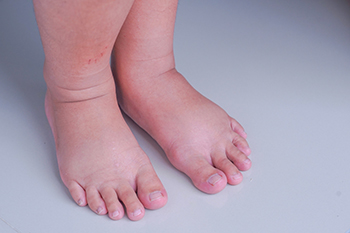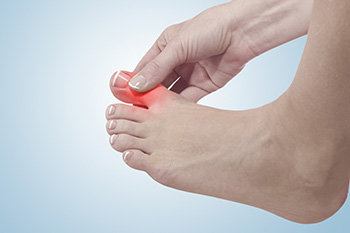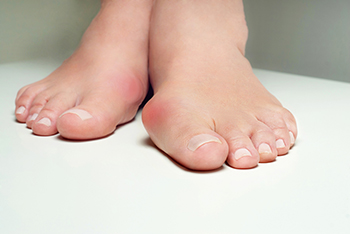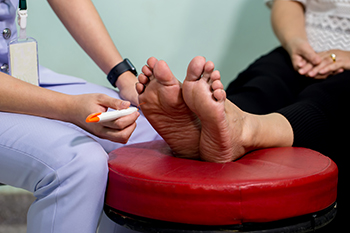Connect With Us
Blog
Items filtered by date: June 2023
Why Are My Feet Swollen?

People who have swollen feet are often aware of the discomfort this condition can cause. It is common among pregnant women and generally begins in the second trimester. The medical term for swollen feet is edema, which is defined as fluid that becomes trapped in the body’s tissues. The feet and ankles are common areas for this to occur, and the fluids can pool in these areas as a result of gravity. Patients who have poor circulation may experience swollen feet, or it may happen to people who have endured a foot injury. Relief may be found when the feet are frequently elevated and compression stockings are worn. It is beneficial to reduce sodium intake, in addition to drinking plenty of water daily. If you have swollen feet, it is suggested that you speak with a podiatrist who can determine the cause and offer correct treatment options.
Swollen feet can be a sign of an underlying condition. If you have any concerns, contact Dr. Howard Horowitz of Bowie Foot & Ankle . Our doctor can provide the care you need to keep you pain-free and on your feet.
Swollen feet are a common ailment among pregnant women and people who stand or sit for extended periods. Aging may increase the possibility of swollen feet and patients who are obese often notice when their feet are swelling too. There may be medical reasons why swollen feet occur:
- Phlebitis - A condition that causes the veins to become inflamed and can also cause leg pain.
- Liver disease - This may lead to low blood levels of albumin which is a protein. This can cause fluid in the blood to pass into the tissues and several areas of the body can become swollen.
- Heart failure - When the heart doesn’t pump properly the blood that is normally pumped back to the heart can pool in the veins of the legs causing swollen feet.
- Kidney disease - One of the main functions of the kidneys is releasing excess fluid in the body. This type of condition can make it difficult for the kidneys to function properly, and as a result the feet may become swollen.
- Deep-vein thrombosis (DVT)- This is a serious condition where blood clots form in the veins of the legs. They can block the return of blood from the legs to the heart which may cause the feet to swell. It is important to be treated by a podiatrist if this condition is present.
Swollen feet can also be caused by bone and tendon conditions, including fractures, arthritis, and tendinitis. Additionally, there may be skin and toenail conditions and an infection may cause the feet to swell. Patients who take medicine to treat high blood pressure may be prone to getting swollen feet.
Many patients elevate their feet to help relieve the swelling and this is generally a temporary remedy. When a podiatrist is consulted the reason behind the swelling can be uncovered and subsequently treated.
If you have any questions please feel free to contact our office located in Bowie, MD . We offer the newest diagnostic tools and technology to treat your foot and ankle needs.
Various Reasons for Toe Pain

Toe pain can happen for various reasons, and may develop suddenly or gradually. It is helpful to find out why the toe pain has happened, which can make it easier in choosing the appropriate treatment. Having a bunion can cause toe pain to develop. A bunion is defined as a bony lump that forms on the side of the big toe, and many cause pain and discomfort. A protective pad may be worn over the bunion for temporary relief. An ingrown toenail often requires the expertise of a podiatrist who can effectively treat it, and apply medicine that can help guard against infection. The bottom of the big toe is affected by the condition that is known as turf toe. It can happen if there is stress while flexing the toe and targets the soft tissues and ligaments. The arthritic condition known as gout can cause debilitating pain and can happen from genetic reasons, or from eating foods that are laden with purines. If you have toe pain for any reason, it is strongly suggested that you are under the care of a podiatrist who can determine the cause and offer correct treatment options.
Toe pain can disrupt your daily activities. If you have any concerns, contact Dr. Howard Horowitz of Bowie Foot & Ankle . Our doctor can provide the care you need to keep you pain-free and on your feet.
What Causes Toe Pain?
Most severe toe pain is caused due to a sports injury, trauma from dropping something heavy on the toe, or bumping into something rigid. Other problems can develop over time for various reasons.
Toe pain can be caused by one or more ailments. The most common include:
- Trauma
- Sports injury
- Wearing shoes that are too tight
- Arthritis
- Gout
- Corns and calluses
- Hammertoe
- Bunions
- Blisters
- Ingrown toenails
- Sprains
- Fractures (broken bones)
- Dislocations
When to See a Podiatrist
- Severe pain
- Persistent pain that lasts more than a week
- Signs of infection
- Continued swelling
- Pain that prevents walking
Diagnosis
In many cases the cause of toe pain is obvious, but in others, a podiatrist may want to use more advanced methods to determine the problem. These can range from simple visual inspections and sensation tests to X-rays and MRI scans. Prior medical history, family medical history, and any recent physical traumatic events will all be taken into consideration for a proper diagnosis.
Treatment
Treatments for toe pain and injuries vary and may include shoe inserts, padding, taping, medicines, injections, and in some cases, surgery. If you believe that you have broken a toe, please see a podiatrist as soon as possible.
If you have any questions please feel free to contact our office located in Bowie, MD . We offer the newest diagnostic tools and technology to treat your foot and ankle needs.
Facts About Bunions

If you begin to feel pain in the middle joint of your big toe, it is quite possible that you may have a bunion. This deformity is caused by prolonged pressure that compresses the big toe and pushes it toward the smaller toes. This in turn causes the middle joint to push outward, resulting in a bony bump on the side of the foot. Besides a genetic disposition to bunions, wearing shoes that are too tight or too small is a major factor in their development. Side effects from bunions include pain in the joint of the big toe, corns, calluses, and difficulty wearing shoes. In some cases, the movement of the tip of the big toe toward the other toes causes it to overlap onto the second toe. This causes problems finding appropriate footwear and can have a negative effect on posture and gait. Wearing shoes with a wider and roomier toe box is one way to reduce the effects of a bunion. Also, avoiding high-heeled shoes can help. Foot pads are available to relieve some of the pressure, as well as wearing shoes made with mesh or more flexible materials. If you have a bunion, it is suggested that you make an appointment with a podiatrist for an evaluation and recommendations for treatment.
If you are suffering from bunion pain, contact Dr. Howard Horowitz of Bowie Foot & Ankle . Our doctor can provide the care you need to keep you pain-free and on your feet.
What Is a Bunion?
Bunions are painful bony bumps that usually develop on the inside of the foot at the joint of the big toe. As the deformity increases over time, it may become painful to walk and wear shoes. Women are more likely to exacerbate existing bunions since they often wear tight, narrow shoes that shift their toes together. Bunion pain can be relieved by wearing wider shoes with enough room for the toes.
Causes
- Genetics – some people inherit feet that are more prone to bunion development
- Inflammatory Conditions - rheumatoid arthritis and polio may cause bunion development
Symptoms
- Redness and inflammation
- Pain and tenderness
- Callus or corns on the bump
- Restricted motion in the big toe
In order to diagnose your bunion, your podiatrist may ask about your medical history, symptoms, and general health. Your doctor might also order an x-ray to take a closer look at your feet. Nonsurgical treatment options include orthotics, padding, icing, changes in footwear, and medication. If nonsurgical treatments don’t alleviate your bunion pain, surgery may be necessary.
If you have any questions, please feel free to contact our office located in Bowie, MD . We offer the newest diagnostic and treatment technologies for all your foot care needs.
Foot Problems Linked to Diabetes

Diabetes, which is a blood sugar and insulin imbalance, is a serious and possibly life-threatening disease. One of the side effects that may come from having diabetes is foot problems. These may be the result of numbness, called sensory diabetic neuropathy, and the inability of wounds to properly heal, termed peripheral vascular disease. Diabetic neuropathy is nerve damage that limits the patient’s ability to feel the presence of a cut or wound on the foot. If a sore goes untreated, it can develop into an ulcer. Peripheral neuropathy is the constricting of the blood vessels to the feet and toes, caused by high levels of blood sugar. This poor blood flow severely affects the healing process, increasing the danger of an ulcer becoming gangrenous. Common sources of foot problems in diabetics include athlete’s foot, fungal nail infections, corns, blisters, and dry skin. In addition to checking the feet daily for sores and wounds, it is suggested that a diabetic make regular appointments with a podiatrist for examination and treatment of their feet.
Diabetic foot care is important in preventing foot ailments such as ulcers. If you are suffering from diabetes or have any other concerns about your feet, contact Dr. Howard Horowitz from Bowie Foot & Ankle . Our doctor can provide the care you need to keep you pain-free and on your feet.
Diabetic Foot Care
Diabetes affects millions of people every year. The condition can damage blood vessels in many parts of the body, especially the feet. Because of this, taking care of your feet is essential if you have diabetes, and having a podiatrist help monitor your foot health is highly recommended.
The Importance of Caring for Your Feet
- Routinely inspect your feet for bruises or sores.
- Wear socks that fit your feet comfortably.
- Wear comfortable shoes that provide adequate support.
Patients with diabetes should have their doctor monitor their blood levels, as blood sugar levels play such a huge role in diabetic care. Monitoring these levels on a regular basis is highly advised.
It is always best to inform your healthcare professional of any concerns you may have regarding your feet, especially for diabetic patients. Early treatment and routine foot examinations are keys to maintaining proper health, especially because severe complications can arise if proper treatment is not applied.
If you have any questions please feel free to contact our office located in Bowie, MD . We offer the newest diagnostic and treatment technologies for all your foot and ankle needs.

